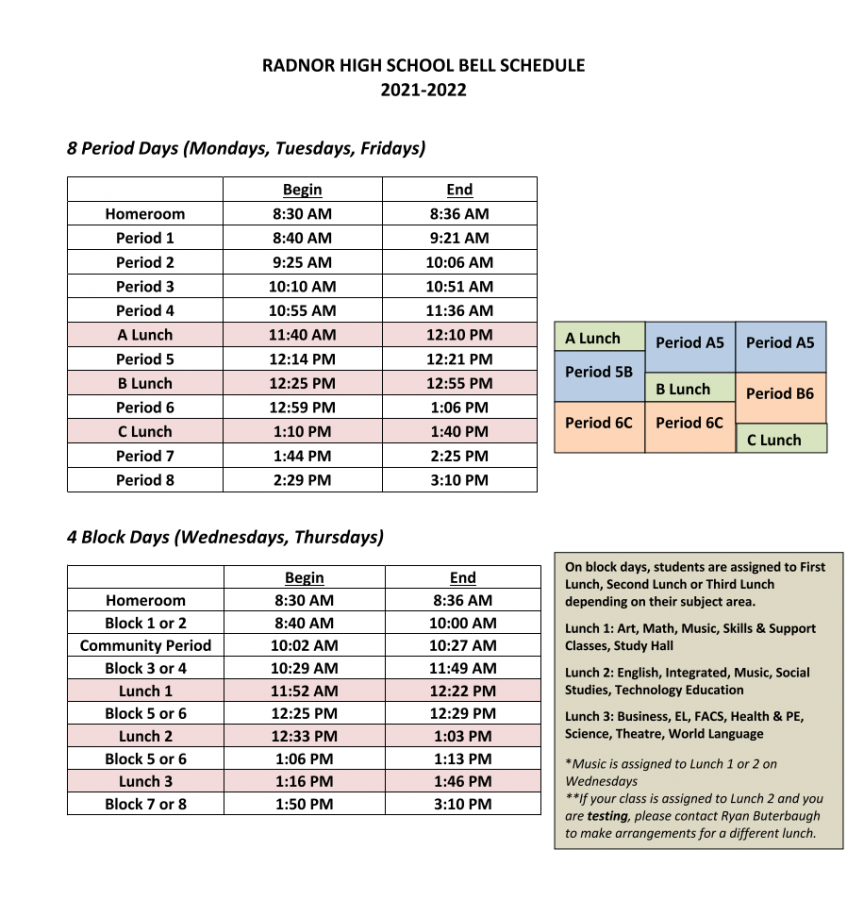Students and staff adapt to pre-COVID bell schedule, following tumultuous 2020-21 school year
Radnor High School’s new weekly bell schedule for the 2021-22 school year. This schedule returns to three 8 period days and two 4 block days a week, which differs from last year’s four 4 block days and one 8 period day a week.
September 21, 2021
RADNOR, September 21 – Radnor High School announced a change to the weekly bell schedule for the 2021-22 school year: instead of continuing last year’s schedule of four 4-block days and one 8-period day every week, RHS will go back to having three 8-period days and two 4-block days every week this year, the same as before the pandemic. The district revealed this change in the 2021-22 student handbook and on the district calendar.
One can easily satirize the 2020-21 school year for what it was. Students last year experienced a rather unusual schedule: an unprecedented four 4 block days a week, 8 period days with random, “dice-rolled” class periods (see the Keystone testing schedules), and so on. Seeing teachers also became unpredictable, as students might see one teacher for two consecutive days and then not for a week. Unannounced schedule changes filled the cycle day calendar, with some months getting over five revisions. Considering how this chaos plagued the previous school year, it makes sense that many students and staff welcome the change back to the more familiar schedule.
Some people welcome it because, as junior Mia Xie remarks, “the day goes by quicker and you get to go to every class.” After all, many students, like junior Hannah Yao, complained last year that the long classes of block days “made school really tiring and [she] ended up having a harder time concentrating.” Considering that classes in block days were over eighty minutes long, one can see how tiring it would be to concentrate, especially for virtual and at-home hybrid students.
However, others long for last year’s schedule, except without the unpredictable changes. Some of them cite stress relief, with homework being the main concern. Senior Minnie Madden says, “Block days also allowed for improved homework distribution because students did not have to juggle every class every night. Only having odd or even periods gave students more flexibility to complete schoolwork around activities and athletics: freedoms I shall miss this year.” Indeed, students have half the classes on block days compared to that of period days. Junior Maryam Naser added that “even though some teachers give a little bit more homework on blocks, it wasn’t nearly as much as the amount of homework on 8-period days.”
Students also say that the block schedules enabled them to understand the curriculum better. As Madden says, “Block periods budget more time to delve deeper into the content. I found the frequent moving around broke up my productivity. [C]lasses would conclude too soon after I had gotten into the rhythm of the lesson.”
Teachers, surprisingly, agree with the latter group of students about the in-depth teaching of the content. English teacher Carl Rosin says, “The 41-minute class periods seem very short now. I like doing a series of exercises that transition into each other during a class period, which is hard when the period is only 41 minutes long.” German teacher Claudia Wissert-Silverman says, “An 80 minute class is ideal for using a variety of teaching modes essential for world language acquisition. Speaking, reading, listening and writing all have to be practiced through direct teacher instruction, individual student work, pair work, group work, and projects. Diving into several of these functions takes time.”
One student, junior Sean Stone even remarked that contrary to making the day go by faster, “the once a week 8-period days…felt very long,” mentioning the fact that there were twice the classes in those days.
Ultimately, it remains to be seen if the reversion back to the pre-COVID schedule affects students’ learning and mental health in a significant manner. As junior Maximilian Muller says, “last year’s block schedule was good because it meant you didn’t have to do a class’ homework everyday, but it was ultimately bad for me since one block was much more challenging than the other and tired me out much faster.”







